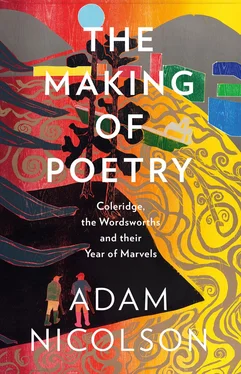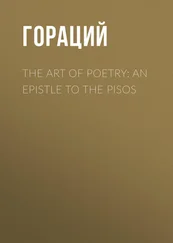Poole laughed at the idea, but his tone was bitter. ‘Now an absolute controul exists,’ he wrote. The souls of Englishmen were ‘as much enslaved as the body in the cell of a Bastile’. That is not far short of revolutionary talk, and William Holland knew him as the enemy:
Met the patron of democrats, Mr Thomas Poole, who smiled and chatted a little. He was on his gray mare, Satan himself cannot be more false and hypocritical … very grand and important, took out his French gold watch and affected much the travelled man, coxcomby and with all the appearance of greatness and liberality he is the most shabby dodging man to deal with I ever met … a selfish vain artful man.
There was undoubtedly a touch of self-importance about Poole. ‘For these opinions I would willingly go to the Tower,’ he once said at a meeting in Nether Stowey. ‘The Tower indeed!’ came from the corner of the room. ‘I should think Ilchester Gaol would do for you.’ And not unlike Joseph Cottle, the Bristol bookseller, Poole was entranced when the brilliant young radical poets turned up in Somerset. He had met Coleridge and Southey in 1794 when they were on a walking tour, scandalising the good people of Stowey by the violence of their principles, claiming that Robespierre was a ministering angel of mercy, sent to slay thousands so that he could save millions. Southey had laid his head on the table in one Poole house and declared that he would rather hear of the death of his own father than the death of Robespierre, a gesture which would have been less effective if his audience had known that Southey’s father was already dead.
The Somerset tanner, concerned for the wellbeing of his people, on the good side of the increasingly polarised political divide, full of admiration and reverence for the genius of the young, also appealed to the poets. They saw in him, with a certain gentlemanly condescension, a version of the ideal man who would later appear in Wordsworth’s lyrics, above all as the good shepherd Michael, ‘stout of heart, and strong of limb’.
It was an idealisation of Poole in which Poole himself was prepared to play his part, arranging for six or seven of his friends to subscribe £40 a year for seven years to save Coleridge from hackwork and encourage him to write the great works that were surely in him.
Poole was the equivalent, as a man, of what the Quantocks could offer as a place. He was an amalgam of the safe and the free, reliable, practical, enfolding but enlarging, no intellectual rival, but radically minded and providing a bower of friendship, a kind of organic rootedness in which liberty and poetry could blossom. ‘Where am I to find rest!’ Coleridge had written to him before coming to live in Stowey, when for a few days it looked as if Poole would be unable to find him a house nearby. The answer Coleridge arrived at was: only when I am with you. ‘I adhere to Stowey,’ he wrote imploringly. Without it, and without him, Coleridge thought he would be ‘afloat on the wide sea unpiloted & unprovisioned’. Poole was the home and harbour Coleridge needed and longed for.
The year in the Quantocks was not a question of a few gentle strolls in a charming corner of England, but setting up a colony of radical hope, ‘a small company of chosen individuals’, in Coleridge’s phrase, embracing more than politics could ever embrace, thinking that with the writing of a poetry that was true to the beatings of the heart, with working in the garden, days spent out on the high tops and evenings in the lush richness of the midsummer combes, some kind of change could be wrought in the soul of England.
This was the cluster of ideas-in-a-place to which Coleridge brought Wordsworth and Dorothy in early July 1797. Their arrival was only one part of his more general gathering of friends and allies. It was not to be a lonely year. He had Poole there already. Soon to come was Charles Lamb, his great and brilliant boyhood friend from his school days at Christ’s Hospital in London. Also walking down from London was a man he knew only by correspondence, John Thelwall, famous across England for his radical lectures, his still more famous treason trial of 1794, at which he had been acquitted, and his continuing harassment and persecution by the spy system of the Home Office and its attendant bullies. There was a chance that Robert Southey, Sara Coleridge’s brother-in-law, would also come, with her sister Edith. Coleridge had broken with Southey, but it was to him that he was continuing to write his most intellectualised of letters. The Wedgwood brothers, the Pinneys, his Bristol publisher John Cottle, his unstable pupil and protégé Charles Lloyd – all were to be swept into the Coleridgean embrace. Nether Stowey in his mind was to be a nest of nightingales, singing for the future.
Just how the Wordsworths, the Coleridges, Lamb, Hartley, Nanny and Mrs Rich were crowded into the tiny house, with the prospect of all these others in the offing, is difficult to imagine. At least there was the outside, the vegetable patch and orchard with the leaning tree, the gate and lane at the back leading to Tom Poole’s house and garden. There Poole had built a rustic summer house made of slabs of oak bark, with a jasmine trained over them, all under the shade of a lime tree – nothing more richly or thickly honey-scented in early summer – and with four big elms ballooning above them. Beyond that were the hills and the combes. The Quantocks beckoned them that July. It scarcely rained, just over an inch in the whole month, with one dry day succeeding another. The thermometer stood above seventy degrees Fahrenheit on more than twenty of those July afternoons, occasionally climbing into the eighties, and with hot nights to follow.
It was a recipe for English summer freedom. Sometimes the walks were solitary, Wordsworth and Dorothy exploring the world Coleridge had brought them to, Coleridge going out on his own, but often all of them went, six or seven of them heading out into the hills. There was nothing inherently odd about this kind of walking. As William Holland repeatedly described, everybody walked, and not only the poor who had no choice. Errand boys did indeed ‘walk from place to place on messages’, and one man walked all the way from London to Over Stowey to get a marriage licence, but gentry neighbours also walked to visit each other, or to have tea, to give people news or to deliver the newspaper whose subscription they shared, up the hill to look at the ships in the Bristol Channel with the spying glass, for picnics, with children to look for birds’ nests, in the dusk or the early morning, or ‘after supper by a fine moonlight’. Husbands and wives, children and young women all went walking on the lanes and paths of the parish.
Walking could be preferable ‘to the jogging of the cart’, or a pleasure in itself: ‘After dinner the young nymphs took a walk … I walked home by the light of the good moon.’ A ‘trudge’ in the snow, or at night with a lantern, or in the rain with an umbrella, were all part of everyday life. In bad weather the women wore pattens, high-soled wooden overshoes to keep the ordinary shoes dry and above the mud, and men heavy boots.
And so, soon after their arrival, the Wordsworths sauntered off on their own. Coleridge had judged them right. Dorothy suddenly expanded into all-enveloping enthusiasm for a country that felt like a mild version of their childhood mountains, even with woods that seemed to match those that had belonged to the Earl of Lonsdale, who had cheated them of their inheritance for so long:
… There is everything here; sea, woods wild as fancy ever painted, brooks clear and pebbly as in Cumberland, villages so romantic; and William and I, in a wander by ourselves, found out a sequestered waterfall in a dell formed by steep hills covered with full-grown timber trees. The woods are as fine as those at Lowther, and the country more romantic; it has the character of the less grand parts of the neighbourhood of the Lakes …
Читать дальше












